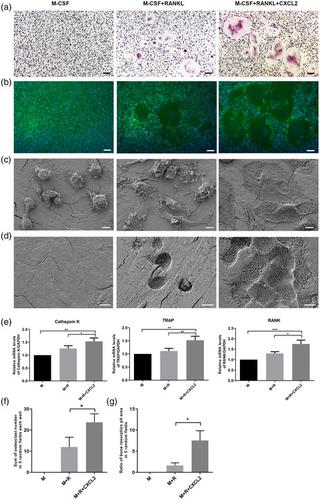当前位置:
X-MOL 学术
›
Clin. Exp. Immunol.
›
论文详情
Our official English website, www.x-mol.net, welcomes your feedback! (Note: you will need to create a separate account there.)
Increased expression of CXCL2 in ACPA‐positive rheumatoid arthritis and its role in osteoclastogenesis
Clinical & Experimental Immunology ( IF 4.6 ) Pub Date : 2020-10-03 , DOI: 10.1111/cei.13527 X Wang 1 , L Sun 1 , N He 2 , Z An 1 , R Yu 1 , C Li 1 , Y Li 2 , Y Li 2 , X Liu 1 , X Fang 2 , J Zhao 1
Clinical & Experimental Immunology ( IF 4.6 ) Pub Date : 2020-10-03 , DOI: 10.1111/cei.13527 X Wang 1 , L Sun 1 , N He 2 , Z An 1 , R Yu 1 , C Li 1 , Y Li 2 , Y Li 2 , X Liu 1 , X Fang 2 , J Zhao 1
Affiliation

|
Anti‐citrullinated protein/peptide antibodies (ACPA) play important roles in the pathogenesis of rheumatoid arthritis (RA). ACPA‐positive (ACPA+) and ACPA‐negative (ACPA−) RA were suggested to be different disease subsets, with distinct differences in genetic variation and clinical outcomes. The aims of the present study were to compare gene expression profiles in ACPA+ and ACPA− RA, and to identify novel candidate gene signatures that might serve as therapeutic targets. Comprehensive transcriptome analysis of peripheral blood mononuclear cells (PBMCs) from ACPA+ and ACPA− RA patients and healthy controls was performed via RNA sequencing. A validation cohort was used to further investigate differentially expressed genes via polymerase chain reaction (PCR) and enzyme‐linked immunosorbent assay (ELISA). Spearman’s correlation test was used to evaluate the correlation of differentially expressed genes and the clinical and laboratory data of the patients. The role of differentially expressed genes in osteoclastogenesis was further investigated. Expression of C‐X‐C motif chemokine ligand 2 (CXCL2) was significantly increased in ACPA+ RA than in ACPA− RA, which was validated in PBMCs and serum. CXCL2 promoted the migration of CD14+ monocytes and increased osteoclastogenesis in RA patients. RAW264.7 macrophages were used to investigate specific mechanisms, and the results suggested that CXCL2 stimulated osteoclastogenesis via extracellular receptor kinase (ERK) mitogen‐activated protein kinase (MAPK) and nuclear factor kappa B pathways. In conclusion, CXCL2 was highly expressed in ACPA+ RA than in ACPA− RA. CXCL2 promoted osteoclastogenesis and was related to bone erosion in RA, which suggests that the blockade of CXCL2 might be a novel strategy for the treatment of RA.
中文翻译:

ACPA阳性类风湿关节炎中CXCL2表达增加及其在破骨细胞生成中的作用
抗瓜氨酸蛋白/肽抗体(ACPA)在类风湿性关节炎(RA)的发病机制中起重要作用。ACPA 阳性 (ACPA + ) 和 ACPA 阴性 (ACPA - ) RA 被认为是不同的疾病亚群,在遗传变异和临床结果方面存在明显差异。本研究的目的是比较 ACPA +和 ACPA - RA 中的基因表达谱,并确定可能作为治疗靶点的新候选基因特征。来自 ACPA +和 ACPA -的外周血单个核细胞 (PBMC) 的综合转录组分析RA患者和健康对照通过RNA测序进行。验证队列用于通过聚合酶链反应(PCR)和酶联免疫吸附试验(ELISA)进一步研究差异表达的基因。Spearman相关性检验用于评估差异表达基因与患者临床和实验室数据的相关性。进一步研究了差异表达基因在破骨细胞生成中的作用。C-X-C 基序趋化因子配体 2 (CXCL2) 的表达在 ACPA + RA 中比在 ACPA - RA 中显着增加,这在 PBMC 和血清中得到了验证。CXCL2促进CD14 +迁移RA 患者的单核细胞和破骨细胞生成增加。RAW264.7巨噬细胞用于研究具体机制,结果表明CXCL2通过细胞外受体激酶(ERK)丝裂原活化蛋白激酶(MAPK)和核因子κB途径刺激破骨细胞生成。总之,CXCL2 在 ACPA + RA 中比在 ACPA - RA 中高表达。CXCL2促进破骨细胞生成并与RA中的骨侵蚀有关,这表明CXCL2的阻断可能是治疗RA的新策略。
更新日期:2020-10-03
中文翻译:

ACPA阳性类风湿关节炎中CXCL2表达增加及其在破骨细胞生成中的作用
抗瓜氨酸蛋白/肽抗体(ACPA)在类风湿性关节炎(RA)的发病机制中起重要作用。ACPA 阳性 (ACPA + ) 和 ACPA 阴性 (ACPA - ) RA 被认为是不同的疾病亚群,在遗传变异和临床结果方面存在明显差异。本研究的目的是比较 ACPA +和 ACPA - RA 中的基因表达谱,并确定可能作为治疗靶点的新候选基因特征。来自 ACPA +和 ACPA -的外周血单个核细胞 (PBMC) 的综合转录组分析RA患者和健康对照通过RNA测序进行。验证队列用于通过聚合酶链反应(PCR)和酶联免疫吸附试验(ELISA)进一步研究差异表达的基因。Spearman相关性检验用于评估差异表达基因与患者临床和实验室数据的相关性。进一步研究了差异表达基因在破骨细胞生成中的作用。C-X-C 基序趋化因子配体 2 (CXCL2) 的表达在 ACPA + RA 中比在 ACPA - RA 中显着增加,这在 PBMC 和血清中得到了验证。CXCL2促进CD14 +迁移RA 患者的单核细胞和破骨细胞生成增加。RAW264.7巨噬细胞用于研究具体机制,结果表明CXCL2通过细胞外受体激酶(ERK)丝裂原活化蛋白激酶(MAPK)和核因子κB途径刺激破骨细胞生成。总之,CXCL2 在 ACPA + RA 中比在 ACPA - RA 中高表达。CXCL2促进破骨细胞生成并与RA中的骨侵蚀有关,这表明CXCL2的阻断可能是治疗RA的新策略。



























 京公网安备 11010802027423号
京公网安备 11010802027423号